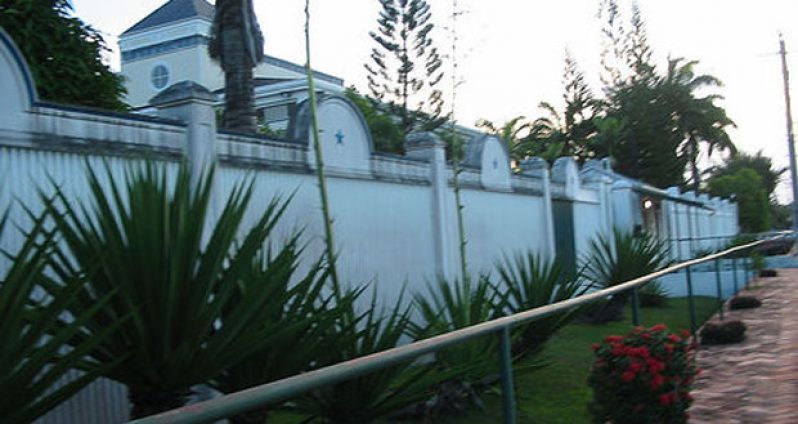HEAD of the Presidential Secretariat (HPS), Dr. Roger Luncheon, says that bilateral relations between Guyana and the United States are not on the verge of a breakdown.

“The notion that there exists an issue between our governments that would allow us to contemplate a rupture in the relationship should not be entertained….Once a sovereign state exercises (its) own sovereignty and (its) own judgment about what is in (its) own national interests, it will generate unease, conflict, disappointment with other states; and that is what diplomatic relations are all about,” he said at his weekly post-Cabinet press briefing yesterday at the Office of the President in Georgetown.
However, he made it clear that recent comments made earlier this month by the outgoing U.S. Ambassador to Guyana, D Brent Hardt, are “most provoking”, with the Georgetown-based US Embassy’s continued implementation of the controversial $300M USAID-funded Leadership and Democracy (LEAD) project which was rejected by the Government.
Dr Luncheon said Government finds provocative the U.S. Embassy’s implementation of activities with regard to the LEAD project in Guyana, despite Government’s disapproval and concern with the impact this would have on the sound bilateral relationship that exists between Guyana and the US.
MOST PROVOKING
“The April 9 revelations by the Ambassador after his meeting with President Donald Ramotar, those revelations are most provoking,” Dr Luncheon said.
“Bad faith comes to mind immediately, readily, but non-disclosure of the continued implementation of the disapproved project, even in the midst of the fervor to have the bilateral engagement conclude to our mutual satisfaction, speaks of premeditation.”

Additionally, prior to the April meeting, the US Ambassador, at a Rotary event in February this year, said: “While we certainly do seek close and productive ties with governments, we are also reaching beyond governments to forge new partnerships with people and civic groups….
“We are promoting an array of education exchanges (and) public outreach, including through new media such as Facebook; boosting entrepreneurism; working with young people; and supporting free and vibrant media outlets.”
The HPS said that Government was horrified to discover ongoing a project on conflict resolution, while at the same time the “one party” was implementing the components of a controversial project in its entirety.
The first component of the project seeks to encourage consensus-building in the National Assembly and facilitate more effective interaction between the Assembly and citizens. The second component seeks to strengthen the effectiveness of the National Assembly and boost citizens’ engagement with Parliament. The third LEAD component seeks to motivate and better equip Guyanese youths to constructively engage in political and civic processes. The fourth component involves civic and voter education relating to local elections and local government reform.
UNHEALTHY DEVELOPMENT
Dr Luncheon made it clear that the developments on the matter are “unhealthy”. He said, “It is unhealthy in the context of the sound bilateral relationship that exists between our governments.
“One can indeed question what exactly is the value that the American Ambassador, the American Administration, places on maintaining and promoting sound bilateral engagements.”
The HPS restated Government’s commitment to re-engage the US Ambassador on talks on the matter, but stressed that Government would not negotiate under duress, and would not discuss a project and its implementation whilst it’s being implemented.
“This (position) is non-negotiable,” he stressed.
INTERFERENCE
The consensus of several stakeholder groups which have registered their concerns over the position of the U.S. on going ahead with the LEAD project is that, while they recognise that the American organisation International Republican Institute (IRI) has been tasked with the implementation of the LEAD project, they also recognise that the IRI has a reputation for interfering in the internal politics of a country.
Government had written to the US Ambassador seeking clarification following reports that aspects of the rejected USAID Leadership and Democracy Project were still being implemented, despite the administration’s objection to its design.
The response received from the US Embassy called on the Government to engage the US on aspects such as the design of the project; and the last meeting on the matter was the April meeting between Ambassador Hardt and President Ramotar.
According to the HPS, the next step now will be Guyana communicating very clearly its firm position on the matter.
“Some of the options (we have) are easily contemplated; the others have a much more profound impact on our bilateral relations…. I do believe we have been specific on our position on this matter. It seems that we have either not been heard or not understood, and therefore an effort must be made to characterise the Government’s position with the greatest degree of finality, and that is what I will be undertaking,” Dr Luncheon said.
FIRST IN TWO DECADES
To date, the United States Embassy has made no public statement with regard to the project and Government’s firm position on its implementation.
In a prior interview, Presidential Advisor on Governance, Ms Gail Teixeira, had said the current position of US officials is a departure from the usual bilateral relations existing between the two countries.
She said, “The problem with the LEAD project is that it is a breach of the normal bilateral relations, as well as that the content has concerns for the Government – concerns which we expressed.
“…this is the first time in 20 years that a project has not gone through that process. It has never happened between 1992 and 2012, and we are not agreeing to it because of the rejection of the Government’s participation.”
Teixeira questioned why the Government was not involved in the consultations on the project. She said the Guyana Government and the American Administration have worked together over the last decades on US-funded projects.
“It has always been a collaborative effort, in which we have agreed on a design of a project and the implementation of that project,” she said.
Referring to examples of the unchallenged implementation of projects that addressed the issue of democracy, Teixeira said: “I was part of other projects that dealt with democracy: the Consolidation of Democracy project, which ran from 2004 to 2006; and the more recent one, from 2009 to 2012, which dealt with trafficking in persons and violence against women and such.
“In all of this, we sat with USAID and the US Embassy to consult on the project over several days, some(times) several weeks, and we came to agreement and the projects were signed off.”
She therefore maintained that the Government’s position has been made clear and remains unchanged in relation to the LEAD project.
“Were the LEAD project to have gone through the protocol over the last 20 years, we probably would have come to an agreement and fine-tuned the number of concerns we had, which we have had with other projects with USAID,” Teixeira said.
She said that what was provided to Government was a “done deal”, and it has been rejected by Government primarily on that basis.
“The main problem is the way in which the project is being implemented,” Teixeira reiterated.
The project was not approved by Cabinet, and this was formally indicated to the relevant authorities on October 26, 2013.




.png)









